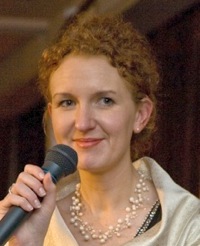 Joanna Dopierala-Konkolowicz, Poland
Joanna Dopierala-Konkolowicz, Poland
First Counsellor – Head of Economic Section
Embassy of the Republic of Poland to Japan
Young Leaders Program (’04)
Joanna graduated from the Faculty of International Trade at the University of Economics in Poznan, Poland in 1999. After completing a special program for government officials at the National School of Public Administration in Warsaw, Poland, Joanna started her professional career in the Ministry of Finance, Department of International Economic Integration. In 2002 she was seconded by the Ministry as a consultant to the Organization of Economic Cooperation and Development (OECD) in Paris. In 2003, Joanna completed a post-graduate program in European Contemporary Studies at the University of Birmingham, UK and was subsequently accepted into the Young Leaders Program at GRIPS in October of the same year. After her graduation from GRIPS, Joanna returned to the Ministry of Finance and from April 2006 she worked as a Head of Unit for Support of Integration Processes in the Department of the European Union. In April 2007 she joined the Ministry of Foreign Affairs as a counsellor, Head of Economic Section of the Embassy of the Republic of Poland in Tokyo. In 2012 she was promoted to the position of first counsellor.
What is your area of specialization and how did you come to work in this area?
I graduated from the University of Economics in Poznań as a specialist in International Trade. Since 2001, when I completed my education in the National School of Public Administration in Poland and joined civil service, I have been working in the field of international economic relations.
I started my professional career in the Ministry of Finance, as a senior expert in the Department of International Economic Organizations in charge of cooperation with OECD and WTO. Shortly after joining the Ministry I was seconded to the OECD in Paris as a consultant on economic survey on Poland, the main topic of which was public finance.
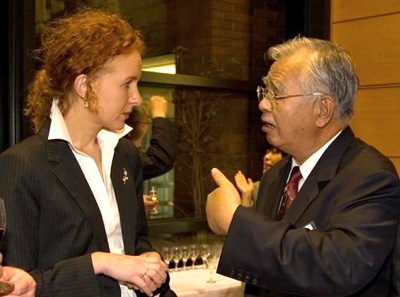
Joanna with Yonekura-sensei
Since I came back from Paris, my career started drifting towards cooperation with European institutions. At that time, Poland started its preparations for accession to the European Union and knowledge of the European policies and procedures became a necessary element of Poland’s international economic relations. For me, the possibility to work closer with the European institutions was also kind of a challenge and experience, that could create broader professional opportunities in the future.
During this interesting period for the Polish administration I was invited to apply for a scholarship in Japan. It took me a while to make up my mind whether I would like to change this Europe-oriented course for Asian perspective. Finally, I decided to apply for the scholarship at GRIPS. At that time I was not aware yet, what impact this move would have on my further professional career.
After finishing the Young Leaders Program at GRIPS I returned to the Ministry of Finance and continued working with the European institutions. As a counsellor and head of division in the Department of the European Union I was responsible for Economic and Financial Affairs Council related issues and for building up the internal procedural and administrative framework within the Ministry of Finance aimed at performing tasks related to the Presidency of Poland in the European Council. At the same time, I was looking for opportunities to work closer with Japan.
In 2006 I found an interesting job opening at the Ministry of Foreign Affairs (Head of Economic Section in the Embassy of Poland in Japan) and after successful completion of the application procedures I started working at the Embassy of Poland in Tokyo as an economic counsellor in April 2007.
You are currently First Counsellor of the Political and Economic Section at the Embassy of Poland here in Tokyo and are about to finish your 5-year posting. Please tell us about your experience here and your main responsibilities and duties.
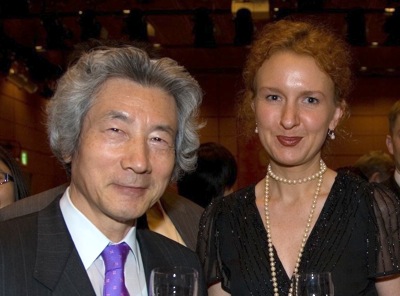
With former Prime-Minister Junichiro Koizumi
My main responsibility is to support and strengthen economic relations between Poland and Japan at the intergovernmental level. In practice, it includes mostly issues related to cooperation in the energy sector, agriculture, transport and infrastructure, environment, trade and investment (at the policy-making and regulatory level). I also monitor macroeconomic situation in Japan, its key policies and their impact on bilateral relations with Poland.
What are some of the biggest challenges you face in your work?
As Poland is not a major economic partner for Japan (and vice versa), the biggest challenge for me is to make people understand each other and recognize the opportunities for mutual cooperation – despite the lack of knowledge, mutual awareness or cultural differences, some prejudices and existing stereotypes. In other words, breaking the ice and preparing an adequate platform for successful bilateral collaboration is the most challenging in my daily work.
What have been the most interesting or rewarding aspects of your career thus far?
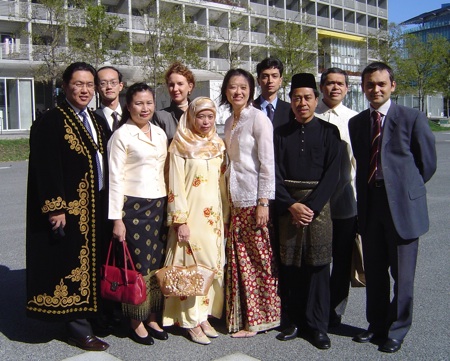
Joanna and YLP batchmates in TIEC, Odaiba
Assignment in the Embassy gives much more freedom of action then work in a big organization such as the ministry. Although diplomats are usually bound by the policies imposed by headquarters, we also actively participate in the process of setting up the policy objectives and directions. For me, identifying new areas and opportunities for bilateral cooperation is the most interesting aspect of my current job. The biggest reward is getting other people (both in Poland and in Japan) involved in the process of achieving the common goals.
What do you see as the main challenges and opportunities for the Poland – Japan relations over the course of the next five to ten years?
Although economic relations between Poland and Japan have substantially strengthened over last decade, there is still a broad potential for further deepening of the bilateral cooperation. In my opinion, the most promising areas of cooperation in the near future are related to infrastructure, energy sector or environment-friendly technologies in particular. I also see a big potential for cooperation in the small and medium size companies sector. Moreover, setting up strong relations between local authorities from both countries could help to release a great potential for bilateral economic cooperation.
However, there are still many challenges ahead. The most outstanding one is the need to increase the mutual awareness of both nations. For Poland it also means the need to build its “brand” in Japan to be recognized by a broader public.
What led you to GRIPS? What is the most important thing you got out of your studies here, and how has your experience at GRIPS prepared you for future endeavours?
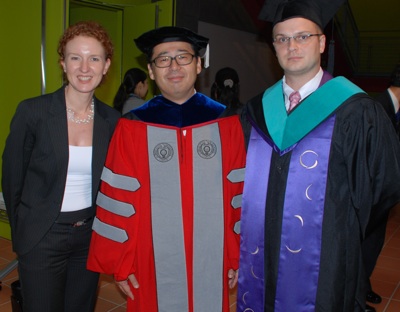
With Kohno-sensei and husband Marcin, at his graduation, also from GRIPS!
My way to GRIPS was probably quite unique. As I already mentioned, I was offered the scholarship in Japan at the time, when I was not very much interested and ready to leave my job for about a year. On the other hand, it was difficult to resist such a tempting offer. I knew that if I did not take this chance to apply for the YLP scholarship then, I would probably never be given such an opportunity again. I decided to apply and take the final decision about going to Japan when I would be admitted to GRIPS. And I was. This was a sign for me that I should take a risk. And no regrets whatsoever! In fact, I fell in love with Japan since the first moment I landed at Narita airport.
I found living and studying in Japan the best adventure of my life. One year passed very fast and I left Japan with a strong hope I could come back one day to this country again. I wanted to return to Japan in a different capacity – as a professional who can strengthen cooperation between Poland and Japan. My studies at GRIPS gave me a solid background to seek such job opportunities.
Within two years since graduating from GRIPS, I applied for the position of the Head of Economic Section in the Embassy of Poland in Japan. I am sure that the knowledge and experience gained during my studies in Japan gave me additional credits in the application process. As a result, in 2007 I was posted in the Embassy of Poland in Tokyo.
Besides this direct impact of GRIPS on my professional career, the YLP program gave me much broader overview of the regional policies in Asia and Pacific. I also gained a new perspective on the global economy and relations between main regional structures. This knowledge has also been quite useful in my professional life.
Finally, I have to mention the human networks set up at the time of my studies in GRIPS, which have been very often helpful in my daily work. This is an important asset we acquire during studying at GRIPS.
What do you miss about Poland and what do you like most about living in Tokyo?
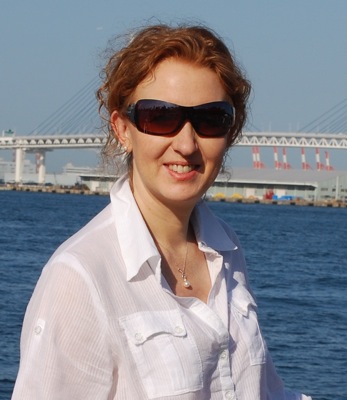 Poland is the place of my birth, where I spent most of my life. When I stay away for a long time, I become homesick. I miss people, family and friends. I also miss places, where I spent the most beautiful moments of my life.
Poland is the place of my birth, where I spent most of my life. When I stay away for a long time, I become homesick. I miss people, family and friends. I also miss places, where I spent the most beautiful moments of my life.
However, since I started working in Japan, Tokyo has become my second home. I truly enjoy living here. The city is very clean and well organized. Its fantastic infrastructure makes residents’ life very easy and comfortable. This is also one of the best places in the world for dining. A mild climate, especially in the winter, makes living in the city really enjoyable.
Although sometimes I feel a bit overwhelmed by the city (high density of buildings and people) I am sure, I will miss Tokyo very much when going back to Poland.
What is your favourite thing to do when you are not working?
“After hours” I really love traveling, discovering new places and meeting new people. It is even greater fun when I can do it together with my family or friends. I like hiking (in spring or autumn) and skiing (in winter). Japan, with its natural beauty, is a perfect place for people who like adventure.
You are currently on maternity leave after the birth of your first son. How are you planning to maintain a balance between your work and family life?
This is a very difficult question. Before I became a mother I used to work over hours and my professional duties dominated in my daily life. Birth of my son has slightly changed my approach to work. He became No.1. Although I still feel a strong commitment to my professional career, I will try to find the way to keep a healthy balance between my job and family life when I return to the office. I still do not know how it would work in practice (please, ask me this question when I am back in the office), but I am convinced it would be possible with some help of my husband.
What advice would you give to current GRIPS students?
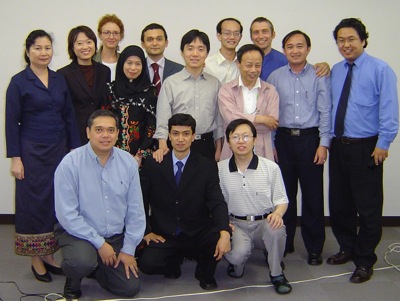
YLP 2003/04 batch
Enjoy every day spent in Japan and take this unique opportunity to get some inspiration from your stay in the country on how to contribute to the change of your homeland in the future. Japan gives a lot of good examples to follow.
Do not miss the chance to get familiar with the Japanese culture and language. You never know, maybe one day you would be back here to work for your country.
Travel as much as you can – Japan is a really beautiful country. When you get back here one day for work, you may not be able to spend time on traveling.
Do not forget about social life and spend some time with your friends from other countries. Such friendships are also an important asset of studying in GRIPS.
Do you have any suggestions on how to further utilize the GRIPS alumni network?
I believe, a strong GRIPS alumni network could be very useful for all of us. People, who graduated from GRIPS are dispersed throughout different countries and regions. Keeping in touch could be helpful both for professional reasons, and private ones. It is always easier to explore the country we do not know well with a help of the insider. As we have the same roots, it is always easier to ask one another for help and assistance.
I think the use of social media very much helps building up the solid human networks. In this sense, GRIPS is already on a good way.





